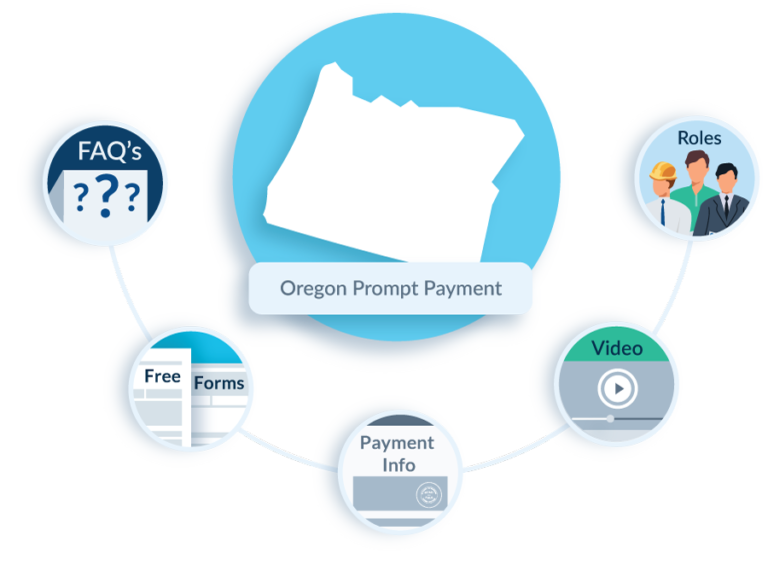Oregon Prompt Payment Requirements
- Private Jobs
- Public Jobs
- Top Links
Prime Contractors
For Prime Contractors, progress payment must be made within 14 days of invoice. Final payment due within 7 days of completion and approval of project.
Subcontractors
For Subcontractors, payment due within 7 days after receipt of payment from above.
Suppliers
For Suppliers, payment due within 7 days after receipt of payment from above.
Interest & Fees
Interest at 1.5% month. Attorney fees to be awarded to prevailing party.
Prime Contractors
For Prime (General) Contractors, progress payments due within 30 days of invoice; Final payment due within 30 days of final acceptance.
Subcontractors
For Subcontractors, payments due within 10 days of payment received from above.
Suppliers
For Suppliers, payments due within 10 days of payment received from above.
Interest & Fees
Progress payments to primes- statutory rate; Final payments to primes- 1.5% per month; Payments to subs/suppliers- 0.75% per month
Interest at statutory rate. Penalty of 1% month. Attorney fees may be awarded to "substantially" prevailing party.
Prompt payment laws are a set of rules that regulate the acceptable amount of time in which payments must be made to contractors and subs. This is to ensure that everyone on a construction project is paid in a timely fashion. These statutes provide a framework for the timing of payments to ensure cash flow and working capital.
Projects Covered by Prompt Payment in Oregon
The Oregon prompt payment provisions are split into two sections, covering both private and public projects. These statutes govern the timing of all payments on construction projects, and impose penalties for late payment in the form of interest.
Private Projects
Oregon’s prompt payment laws that regulate payments on private construction projects within the state can be found in the Or. Rev. Stat. §720.620 et seq. This applies to all private projects except contracts for construction of low-rise residential dwellings or low-income housing projects.
Deadlines for Payment on Private Projects
Progress payments to the prime contractor from the property owner are due within 14 calendar days of receipt of a proper request for payment. As for final payments, the owner must release payment within 7 calendar days of the owner’s acceptance of the work. These deadlines may be extended only if contract documents use the specific statutory language for the “Notice of Extended Payment Provision.” All other payments to subcontractors and suppliers must be made within 7 days of the higher-tiered party’s receipt of payment.
Penalties for Late Payment for Private Projects
Oregon prompt payment laws do provide a list of reasons why payment can be properly withheld. If none of these circumstances exist, and payment is either late or wrongfully withheld, interest will begin accruing at a rate of 1.5% per month, or the rate set forth in the contract; whichever is higher. Also, if the dispute goes to court or arbitration, the prevailing party will be awarded costs and attorney fees.
Public Projects
Payments on public works projects in Oregon are regulated by Or. Rev. Stat. §279C.320, .505, .515, .570, and .580. These rules do not apply to public contracts for emergency work, minor alterations, or ordinary repair of maintenance of public property.
Deadlines for Payment on Public Projects
Progress payments made from the public entity to the prime contractor must be made to the prime contractor within 30 day of receipt of a request for payment. Final payments to the prime are required to be made within 30 days of receipt of final acceptance of the project. If the pay request is defective or in dispute, the agency must notify the contractor within 15 days of receipt. If the invoice is corrected and submitted within 7 days from receiving notice, payment must still be made according to the original 30-day timeframe. As for all payments to subcontractors and suppliers, payment must be released within 10 days of the higher-tiered party’s receipt of payment from above.
Penalties for Late Payment for Public Projects
The Oregon prompt payment statute for public projects, just as for private jobs, provides a list of reasons that payment can be properly withheld. If these reasons aren’t present, and payment is late or wrongfully withheld, the unpaid balance will be subject to interest penalties. The rates vary depending on the type of payment, and to whom payment is being made.
Late progress payments to prime contractors will accrue interest at a yearly rate of “three times the discount rate in effect in the Federal Reserve Bank whose district includes Oregon.” However, the rate of interest cannot exceed 30%. Final payments to prime contractors will be charged with an interest rate of 1.5% per month. And lastly, all late payments to subcontractors and suppliers will have an interest rate of (% per year (0.75%/month) imposed on the unpaid balance.

